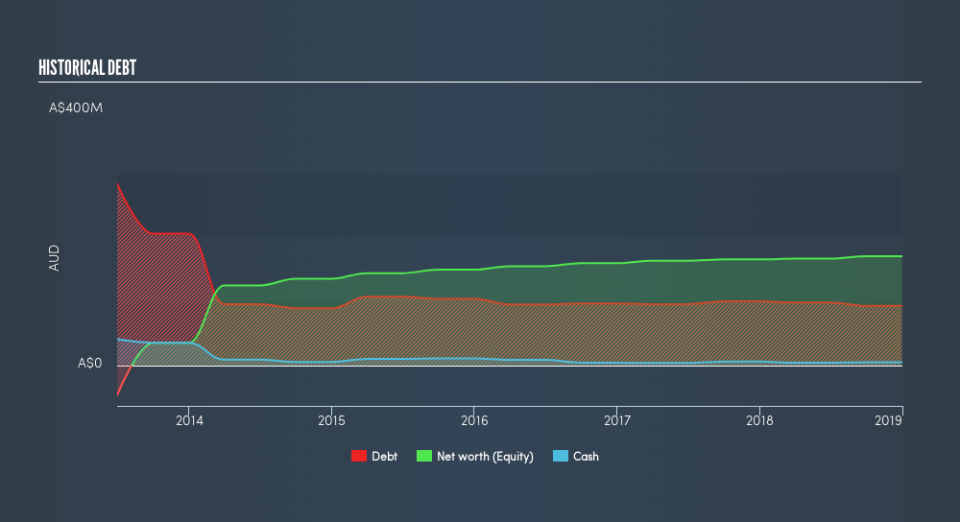Monash IVF Group (ASX:MVF) Has A Pretty Healthy Balance Sheet

Some say volatility, rather than debt, is the best way to think about risk as an investor, but Warren Buffett famously said that 'Volatility is far from synonymous with risk.' So it might be obvious that you need to consider debt, when you think about how risky any given stock is, because too much debt can sink a company. As with many other companies Monash IVF Group Limited (ASX:MVF) makes use of debt. But the more important question is: how much risk is that debt creating?
When Is Debt Dangerous?
Debt and other liabilities become risky for a business when it cannot easily fulfill those obligations, either with free cash flow or by raising capital at an attractive price. Ultimately, if the company can't fulfill its legal obligations to repay debt, shareholders could walk away with nothing. However, a more usual (but still expensive) situation is where a company must dilute shareholders at a cheap share price simply to get debt under control. Of course, the upside of debt is that it often represents cheap capital, especially when it replaces dilution in a company with the ability to reinvest at high rates of return. When we think about a company's use of debt, we first look at cash and debt together.
Check out our latest analysis for Monash IVF Group
What Is Monash IVF Group's Net Debt?
The image below, which you can click on for greater detail, shows that Monash IVF Group had debt of AU$92.8m at the end of December 2018, a reduction from AU$99.9m over a year. On the flip side, it has AU$4.60m in cash leading to net debt of about AU$88.2m.
A Look At Monash IVF Group's Liabilities
We can see from the most recent balance sheet that Monash IVF Group had liabilities of AU$21.3m falling due within a year, and liabilities of AU$96.5m due beyond that. Offsetting these obligations, it had cash of AU$4.60m as well as receivables valued at AU$4.28m due within 12 months. So its liabilities total AU$108.9m more than the combination of its cash and short-term receivables.
This deficit isn't so bad because Monash IVF Group is worth AU$346.6m, and thus could probably raise enough capital to shore up its balance sheet, if the need arose. But we definitely want to keep our eyes open to indications that its debt is bringing too much risk.
We use two main ratios to inform us about debt levels relative to earnings. The first is net debt divided by earnings before interest, tax, depreciation, and amortization (EBITDA), while the second is how many times its earnings before interest and tax (EBIT) covers its interest expense (or its interest cover, for short). The advantage of this approach is that we take into account both the absolute quantum of debt (with net debt to EBITDA) and the actual interest expenses associated with that debt (with its interest cover ratio).
With a debt to EBITDA ratio of 2.4, Monash IVF Group uses debt artfully but responsibly. And the alluring interest cover (EBIT of 9.1 times interest expense) certainly does not do anything to dispel this impression. Unfortunately, Monash IVF Group's EBIT flopped 18% over the last four quarters. If earnings continue to decline at that rate then handling the debt will be more difficult than taking three children under 5 to a fancy pants restaurant. There's no doubt that we learn most about debt from the balance sheet. But it is future earnings, more than anything, that will determine Monash IVF Group's ability to maintain a healthy balance sheet going forward. So if you're focused on the future you can check out this free report showing analyst profit forecasts.
Finally, a company can only pay off debt with cold hard cash, not accounting profits. So it's worth checking how much of that EBIT is backed by free cash flow. Over the most recent three years, Monash IVF Group recorded free cash flow worth 60% of its EBIT, which is around normal, given free cash flow excludes interest and tax. This free cash flow puts the company in a good position to pay down debt, when appropriate.
Our View
Based on what we've seen Monash IVF Group is not finding it easy EBIT growth rate, but the other factors we considered give us cause to be optimistic. In particular, we thought its interest cover was a positive. We would also note that Healthcare industry companies like Monash IVF Group commonly do use debt without problems. When we consider all the factors mentioned above, we do feel a bit cautious about Monash IVF Group's use of debt. While we appreciate debt can enhance returns on equity, we'd suggest that shareholders keep close watch on its debt levels, lest they increase. We'd be motivated to research the stock further if we found out that Monash IVF Group insiders have bought shares recently. If you would too, then you're in luck, since today we're sharing our list of reported insider transactions for free.
At the end of the day, it's often better to focus on companies that are free from net debt. You can access our special list of such companies (all with a track record of profit growth). It's free.
We aim to bring you long-term focused research analysis driven by fundamental data. Note that our analysis may not factor in the latest price-sensitive company announcements or qualitative material.
If you spot an error that warrants correction, please contact the editor at editorial-team@simplywallst.com. This article by Simply Wall St is general in nature. It does not constitute a recommendation to buy or sell any stock, and does not take account of your objectives, or your financial situation. Simply Wall St has no position in the stocks mentioned. Thank you for reading.

